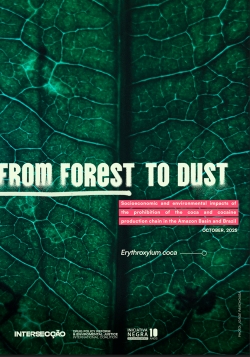Out now: From Forest to Dust
On by Ella Ronan
Exposing the socioeconomic and environmental impacts of the prohibition of the coca and cocaine production chain in the Amazon basin and Brazil.

Our landmark new report is out now, written by the International Coalition for Drug Policy Reform & Environmental Justice, Health Poverty Action, and many partners across Latin America and Europe.
Read the report
‘From Forest to Dust’ exposes how decades of prohibition‑focused drug policy have become deeply intertwined with organised crime, land grabbing, environmental destruction, and racialised violence.
The report maps how the global cocaine supply chain, from cultivation through to refining, transit and export, overlaps with conservation units, indigenous land and quilombola territories. It reveals how prohibition doesn’t suppress the trade but fuels it, enabling criminal networks to co‑opt weak governance, exploit people living in poverty and divert attention from structural inequality. The Amazon has become a ‘strategic nexus’ for illicit economies:
“The increase in drug trafficking is connected to other crimes such as illegal mining, land grabbing, logging, smuggling, wildlife trafficking, illegal fishing, sexual exploitation, arms and wildlife trafficking and deforestation. These practices are accompanied by corruption, fraud in environmental licensing, intimidation and armed violence.”
The futility of repression is plain to see. Despite years of militarised interventions, the coca and cocaine production have never been higher. The report highlights how the drug war has become a war on the poor, on nature and on justice. Communities that already lacked infrastructure, rights over their land, or meaningful state protection, are imposed by parallel governance by criminal networks.
With the world preparing for COP30, this research makes a vital connection which the world must listen to: climate policy, land justice and drug policy are undeniably interconnected. The report calls for urgent legal regulation of drugs; community‑led land rights and restorative justice; and ecological harm reduction tools that recognise the intertwined fate of people and planet.
Read the report

